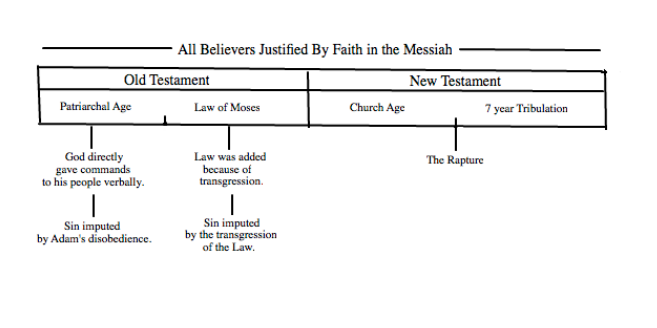Most Christians are wrong for believing that Romans chapter 7 is talking about Paul struggling with sin as a Christian. Actually, Paul is speaking to his ex Jewish brothers (or those trying to keep the Law of Moses). He is referring to his experience as an outward Jew (Before He came to Christ) trying to obey the Law. Paul gives these outward Jews the solution to overcome their struggle to keep the Law with Romans 8:1 (in the next chapter).
#1. Paul is repeating a point He made in chapter 5.
For there was no such thing as chapter breaks in the Bible. They were added later. Anyways, to understand chapter 7, you have to know what was going on in chapter 5.
In Romans chapter 5 we learn, "For by one man sin entered the world and by one man many shall be justified."
Now, under the Mosaic Law there was an accounting and those under that Law had to bring their sacrifices accordingly. Prior to the Mosaic law, the Patriarchs offered sacrifices to God, but not as a result of particular sins–not because God said to them if you do such and such sin then you have to offer such and such sacrifices. The sacrifices of the Patriarchs were offered based upon faith, not law. Which explains the context of Romans 5:13.
For sin was no doubt in the world prior to the law and so was transgression, hence there had to be some kind of law. For obviously Paul does not contradict himself here. He says that sin was not accounted until the law came. The point is that there was no law from God to this point that had been codified, that is, placed into written form. Before the Law of Moses, sin was not imputed because there was no written Law to transgress. Then how was sin imputed to those living before the written Law? Well, sin was imputed to those living before the Law because the "death of sin" was passed down to them thru Adam's disobedience (Romans 5:12, 14, 17, 18, 19). Those living before the Law, were exclusively justified by faith and those who did not live by faith were condemned. In other words, the Old Testament saint living before the Law was justified by following Romans 8:1. Yes, they did not know who Christ was yet or this passage, but the Spirit of Christ was in fact within the prophets, though (1 Peter 1:10, 11).
This point of the Law in Romans 5 is made in Romans chapter 7. Compare Romans 7:8-10 with Romans 5:12-14 and Romans 5:20.
#2. This passage is an answer to the question “Did that which was good [the Law], then, become death to me?” (Romans 7:13) Paul is not primarily interested here in discussing anyone's struggle with sin. He is explaining how the Old Testament Law – good in itself – was used by sin to bring death to pre-Christians.
#3. Paul knows that Christians struggle with sin; after all, many of his letters are written to help churches deal with sin. But he discusses the Christian struggle with sin in the next chapter (Romans 8:10-14). His conclusions about the struggle there do not seem to me to be consistent if chapter 7 is also about the Christian struggle with sin.
#4. Paul’s only positive description of the “me” in this passage is elsewhere applied to Jews, not Christians. “I agree with the Law, that the Law is good” (Romans 7:16) and “I delight in the law of God in my inner man” (Romans 7:22). But this is more in line with Paul’s description of Jews: “If you call yourself a Jew and rely on the Law” (Romans 2:17). In Romans, Christians have “died to the Law” (Romans 7:4) and thus “delight in the Law” is not most naturally applied to Christians.
#5. Paul’s negative descriptions of the “me” in the passage are elsewhere applied to Jews, not Christians.
“I am fleshly, sold into bondage to sin” (Romans 7:14). Compare to “we were in the flesh” (Romans 7:5); “we were freed from sin” (Romans 6:18); “we were slaves to sin” (Romans 6:20); and “you are not in the flesh but in the Spirit” (Romans 8:9).
“But I see another law… making me a prisoner of the law of sin” (Romans 7:23). Compare to “but now, freed from sin and enslaved to God” (Romans 6:22); and “the law of the Spirit of life has set you free from the law of sin and death” (Romans 8:2).
If Paul says that Christian are no longer in the flesh and are no longer slaves or prisoners of sin, then it seems to make the most sense to say that he is talking about his pre-Christian experience when he was Jew here in Romans 7:14-25.
Anyways, I hope this helps.
And may God bless you.
Sources Used:
Paul is not Talking about Himself: Why I take the "pre-Christian" Reading of Romans 7:14-25
Theology Online | Christian Forums & More - View Single Post - ECT Christians and the Old Testament

